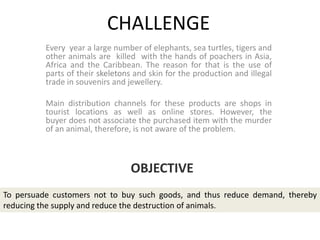Ycl2012 media 11
- 1. CHALLENGE Every year a large number of elephants, sea turtles, tigers and other animals are killed with the hands of poachers in Asia, Africa and the Caribbean. The reason for that is the use of parts of their skeletons and skin for the production and illegal trade in souvenirs and jewellery. Main distribution channels for these products are shops in tourist locations as well as online stores. However, the buyer does not associate the purchased item with the murder of an animal, therefore, is not aware of the problem. OBJECTIVE To persuade customers not to buy such goods, and thus reduce demand, thereby reducing the supply and reduce the destruction of animals.
- 2. INSIGHT A person buys a product made of ivory, tortoise shell, and others as a gift for himself, relatives or friends. He wants to have a thing with a local touch, to have something reminding him about his journey, about the country he¡¯s visited. He is not aware of very direct connection between the massacre happening behind the scene and souvenir production. However, once you¡¯ve bought a souvenir, you had already paid to the murderers. You become involved in that mess right after opening your wallet. Being an accomplice of the murder is bad and no one would ever tell anybody about it. This is the way a "skeleton in the closet" appears in your life. And this is something no one could call a best gift, and it has nothing to do with a good memory. INSIGHT: I do not need a skeleton in the closet
- 3. STRATEGY Two directions OFFLINE ONLINE travellers who customers who buy products in the buy products online country of origin IDEA Any product made from the bones of an elephant, tortoise shell, etc. (ie the parts of the skeleton of animals) is in both direct and figurative meaning the skeleton in the closet: part of a dead animal and a reminder of being involved to the murder of an animal.Nobody needs a gift which has such a negative history.
- 4. ACTIVATION OFFLINE At check-in desks in the airports next to a sign depicting the things forbidden to carry aboard we put an extra sign with the image of sponged out skeletons of an elephant, turtle, tiger.
- 5. ACTIVATION OFFLINE At the tourist information centers, airports, railway stations and places of trade we distribute free gift bags. On the one side there is "Gift Bag" written and on the other "Do not put skeletons inside" with a picture of sponged outskeleton and the text: "When you buy products from parts of animals, you buy their skeleton. So you pay for the murder. No one should know about your secret. This will become your skeleton in the closet.¡±
- 6. ACTIVATION OFFLINE We post a series of prints on billboards in airports, train stations, as well as on video screens in airplanes. They show a person who gave a gift (we see its image on the bag- statues of ivory, turtle jewelry and etc..)to wife / husband / child / friend. A person who received a gift, with the sour face puts a skeleton of the animal in the closet. The slogan on the print: "Your wife does not need a skeleton in the closet", "Your child does not need a skeleton in the closet," "You do not need a skeleton in the closet," etc.
- 7. ACTIVATION OFFLINE Shops, which refused to sell those products will be signed with a specified product labels ¡±skeleton-free zone¡± * There is a reference to the IFAW website on every print produced
- 8. ACTIVATION ONLINE Using Google context ad. When person googles smth related to ivory, tortoise shells, tiger skin, etc., he will see the context ad, that includes advertising campaign's slogan ?You don¡¯t need a skeleton in your closet¡± and link to the IFAW web-site. Whenever the search is related to a purchase of goods listed above, the google search field shows an animation of hunting, killing an animal and making a souvenir out of it. When person is searching for flights in areas of Asia, Africa and the Caribbean on popular sites for tickets-purchasing, ananimated pop-up banner with the print is displayed (the print is the same as in offline version). By clicking it will lead to the IFAW website.
- 9. SUMMARY We understood, that the main distribution channels of the illegall wildlife products trade are shops intourist locations and online stores. We understood, that the customer does not see any direct connection between the killing ofanimals and souvenir production. We show that when person buys wildlife products he becomes involved into murder. Nobody wants to be a murderer. We've created a strong connection between buying a souvenir and becoming a copartner in murder, thus forcing tourists to give up buying things made of animal bones.









